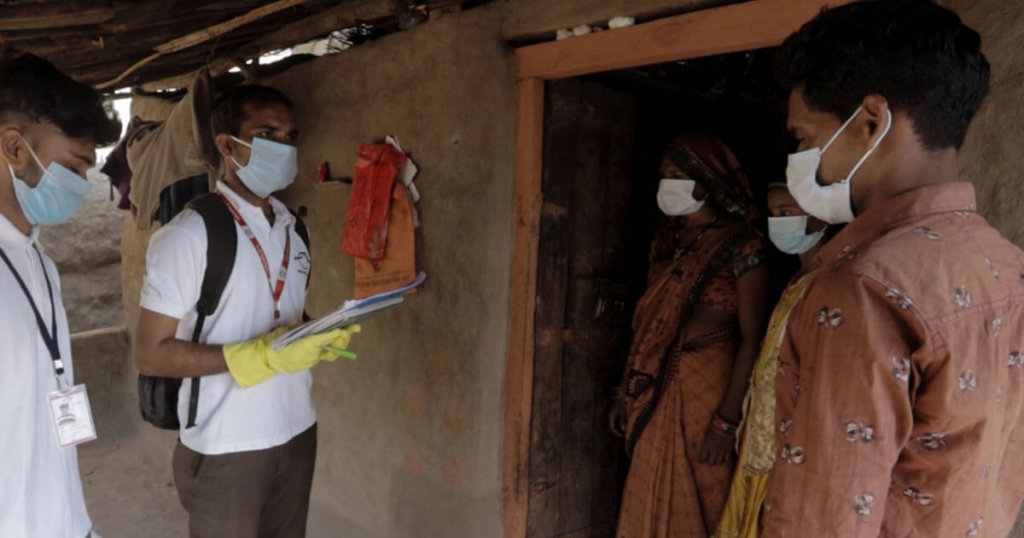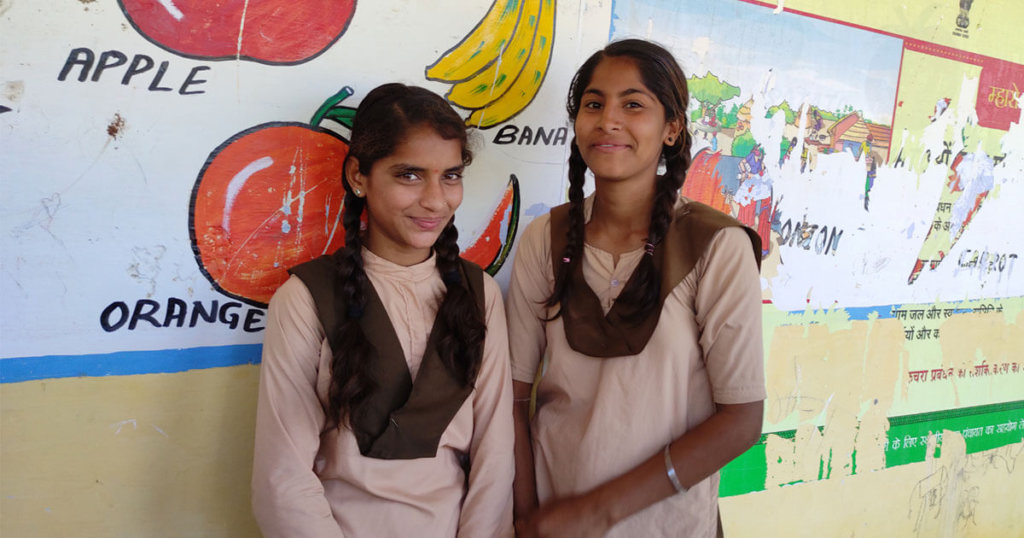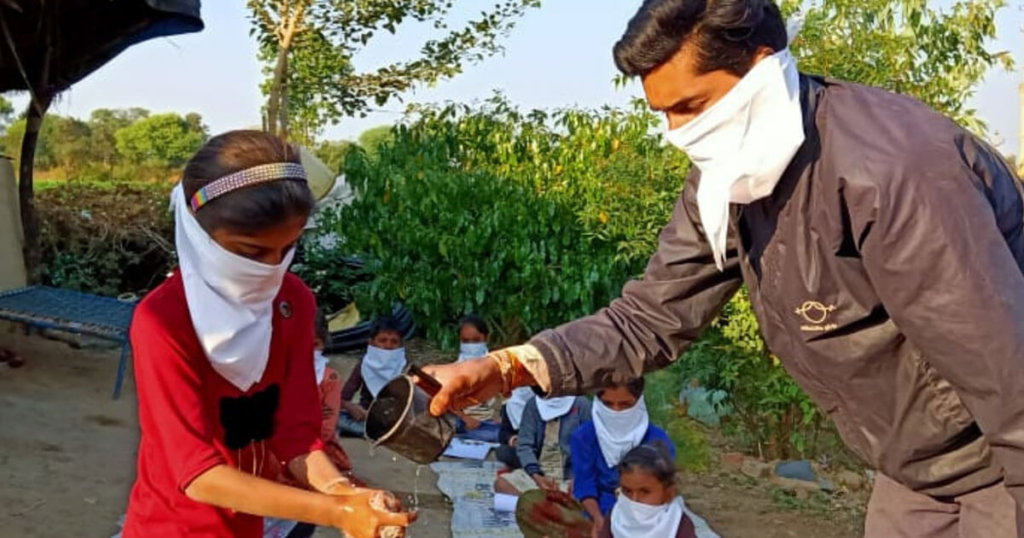Educating a girl child doesn’t just add value in their lives alone, it brings a ripple of positive changes for their families and the society at large.
When you educate a girl child, you empower her to fight the evils like child marriage and HIV+. When a girl child is given her Right to Education, the economy booms, and inequalities are reduced.
But girls’ education does not equate to building schools. Because it is not always the educational infrastructure that is becoming the roadblock in the girls’ education, it is often the societal norms that don’t allow our girls to learn.
Hence, girls’ education is about a psychological shift in society at large. It is about ensuring that school infrastructure ensures girls’ safety and needs. Most importantly, girls’ education means empowering girls to exercise their rights.
It is with this understanding that Educate Girls designed its interventions in the communities. We work to bring a permanent change at the grassroots by changing the mindset of people. We work on 2 Ps – poverty and patriarchy, mostly because of which girls don’t get educated in India. From convincing parents to equipping our teachers with better tools and training, Educate Girls aims to contribute towards the society where girls are encouraged to learn.
One of our partners, Neera Nundy, Partner and Co-founder, Dasra says, “Educate Girls has the unique combination of working through the school system in partnership with the community that enables scale and shows the direct impact of keeping girls in school.”
In today’s blog, we will talk about what it takes to send a girl child to school. It will also talk in detail about the factors that are important to ensure our girls complete their schooling.
1. CHANGE IN PARENTS’ PERSPECTIVE
Girls are often left behind because they are not considered equals by their own parents. Be it any circumstance, girls are expected to make adjustments and sacrifices in the name of family.
Educating a girl child is not an acceptable norm in many societies to start with. Especially in rural parts of the country, girls are expected to learn household chores and take care of their younger siblings. As soon as they hit puberty, they are married off in the name of culture or meeting one’s responsibilities.
In some little progressive households, where girl education is considered, the chances of a girl child attending a school largely depend on her siblings. If there is a boy in a family, his education is often prioritized as they are considered to be the bread earners. Even if girls are given a chance to attend school and learn, they are often the first ones to drop out when the family goes through bad financial days. Also, when the disaster hits and families are forced to migrate, girls are made to look after their families, putting their education in the back seat.
Hence, the change has to start from the home. Until and unless the parents of girl children will understand and support the education of their child, things will not change for our girls. Until our girls will be seen as an asset rather than a liability in a family, our girls will have to fight for their rights with their own families.
That is why, at Educate Girls, our effort is not just to enroll girl children in school but to ensure that they stay in school and complete their education. Hence, with the help of our village based community volunteers- Team Balika, we reach to the communities beyond schools to spread awareness about girls’ education. Under this program, our volunteers go and meet the parents of girls and make them aware of the need to educate their girls. These volunteers play a very crucial role in breaking the age-old beliefs of parents and convincing them to give their girl children an equal opportunity in life.

2. MAKING GIRLS AWARE OF THEIR RIGHTS
When we are often told that we are worthless, at some point we believe it.
Now imagine being oppressed since the day you are born and are called a liability. Imagine being criticized for every action of yours and your own parents cursing the day you were born. That’s a reality for many girl children across the world.
Girls are unwanted in many societies. When someone is unacceptable by their own family, they are often the victim of self-doubt and lack self-worth. In such a scenario, it’s unlikely for anyone to be aware of their rights.
Hence, to educate our girl children, building schools alone won’t be enough. To ensure that our girls learn and strive, we will have to make sure that our girl children know about their rights and are empowered enough to exercise them. With love and support, we will slowly have to help our girl children to fight the years of oppression and fear. Slowly we will have to make them stronger to raise their voice against injustice. Slowly we will have to build their confidence to make their own decisions and participate in the matters that affect them the most.
At Educate Girls our mission is not just to enroll girl children in schools, we strive to make our girl children aware and empowered so that they can fight for their Right to Education.
Meet one such empowered girl, Riya. Riya hails from a small village in the Banswara district of Rajasthan, India, where education for girls is often considered a waste of time. She was blessed enough to be given a chance to attend school earlier when her three older sisters used to take care of their household chores. But things changed for Riya when her sisters were married off and her parents dropped her out of school to look after their house.
One day, an Educate Girls’ Field Coordinator went to speak to Riya’s parents who repeated their claims about the importance of keeping Riya home. Undeterred, Prakash kept visiting, discussing the value of education for girls. During one particular home visitation, Riya, mustering all her courage, made an impassioned plea to her parents to let her go back to school. At that point, her parents finally relented and she was enrolled in class 3!
3. ENSURING GIRLS NUTRITION
No child can learn when they are hungry. Before we expect our children to concentrate in class and learn, we need to ensure that their stomach is full. For children to perform better in school, they must get the right nutrition. Several studies have also justified the positive effects of a nutritious diet on children’s grades.
To ensure the same, the ‘Mid Day Meal’ scheme was also introduced in schools that aimed to serve hot nutritious lunches to school children. This National Programme of Nutritional Support for Primary Education also became the motivator for many parents to send their children to school. Families that couldn’t afford two square meals a day for themselves, saw this as a blessing for their children to have at least one nutritious meal a day.
Healthy food also means that the children will rarely fall sick and stay healthy to attend school regularly. Hence, to keep our girls in school, we need to take care of their nutrition as well.
Besides, women are often responsible for fulfilling the food requirements of their households. A woman will be able to serve her family better only if she herself is educated and aware of the right kind of nutrition. A girl’s knowledge about nutrition also translates into better or worse health for her children. An educated woman is often a healthier mother. Hence, to achieve #SDG3- Good Health and Well Being, it is important that our #GirlsGoBackToSchool. Because only an educated woman can become a responsible mother.

4. GIRLS FRIENDLY TOILETS IN SCHOOLS
Many girls who attend school suddenly drop out when they are around 13 years of age. Reason- menstruation!
Menstruation is still a taboo topic that is addressed in hushed tones in the corners of the house. It is still seen as evil and impure when girls are restricted to perform even their basic activities.
In the times when there are so many myths surrounding this topic, plus unawareness of reproductive health, girls often start avoiding school during the days of menstruation. One of the biggest reasons for the same is also the lack of hygienic sanitary facilities in the school. Because of no separate and proper toilets, girls tend to miss school for 6 days every month. For many, this inconsistency in attending school often leads to complete dropout when they hit puberty.
According to the report released by Dasara in 2015, 23% of girls drop out of school reaching puberty because of inadequate sanitary facilities. Now, what does that tell us? This plainly explains why making schools alone is not sufficient to ensure education for our girls. Our schools need to provide basic facilities like toilets to help our girls attend school every day even after they are 13.
This also means proper sanitary facilities at school are one of the crucial enablers for our girl children to complete their secondary education.
Breaking myths around menstruation is equally important. Menstruation as a topic needs to be talked about openly in classrooms. It needs to be normalized as a subject for our girls to feel comfortable in school while they are on their periods. It is important to talk about menstruation also to ensure better reproductive health among our girl children. Awareness is empowerment and we need to spread it, one girl child at a time.

5. ENABLING A SAFE ENVIRONMENT AT SCHOOL
For schools to teach anything to our girl children and build confidence in them, our schools need to be that space where the child feels safe and protected.
Often girls become the victims of crime and hatred by society just because they choose education over household chores. Also, when a girl steps out of her house, her boldness is often taken for shamelessness and she is subjected to unwanted evils like eve-teasing.
In certain cases, one such unfortunate incident becomes the reason for a girl to drop out of school. It is preferable to keep girls at home to ‘protect’ them rather than facing the perpetrator.
Teachers also play a very crucial role in enabling a safe environment for kids at school. Teachers too come from the society where many believe that a girl’s place is in the house, taking care of her children and not in school. Hence, it is very important that the teachers treat our children equally and encourage girl children to learn and thrive.
In many cases, teachers are the role models or the source of fresh perspectives that the girl children look up to. What a teacher thinks about a particular issue reflects a lot in their teaching and that can make or break the confidence of children in themselves.
Once our Founder, Safeena met an out-of-school girl and asked her “What do you want to be?” to which she replied, “Nobody has ever asked me this question so I have never thought about it.” The same girl is now enrolled in school by Educate Girls and today she aspires to be a police officer! This is the power of education.
We at Educate Girls believe that to bring any change, it is important to talk about it. We encourage you to participate in this dialogue and raise your voice in the favor of girls’ education. Share your thoughts on what else do you think is important to ensure our girls complete their schooling? We will look forward to hearing from you in the comments below.
Educate Girls is on a mission to empower 1.6 million out-of-school girls in India. Your charity will help us support another girl child in need.
To join our efforts, donate here- https://educategirls.us/donate/. We also partner with several corporates, foundations, and venture philanthropists. These valuable partnerships help the organization maintain its program implementation, strengthen organizational capacities, and uphold high-quality standards. If you can help us build such partnerships or want to obtain more details about funding/partnership opportunities, you can contact us at [email protected].

